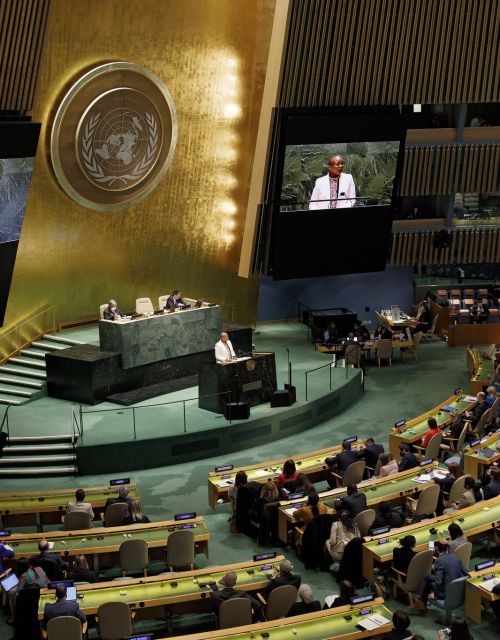While the agreements we saw are welcomed - considering the stalemate of negotiations and lack-lustre ambition by governments – what are we actually seeing here?
Loss and damage: encouraging progress
The biggest breakthrough at this so-called Africa COP was on funding for loss and damage in emerging economies.
Today, loss has a name and damage has an address: for example, what will smallholder cocoa farmers in Ghana do if a prolonged drought makes it impossible to grow crops and earn a living? Where will people displaced by natural disasters, like the millions of families in Pakistan affected by floods, for instance, move to next?
This fund is a remarkable step forward for the protection of those countries most vulnerable to the devastating effects of climate change.
But the new fund is not without its challenges: to have a true social and climate impact, we need clarity on who will fund it, and how disbursement will happen without bureaucratic bottlenecks. What we cannot afford is to have it become an empty bank account. Here is our colleague Martin Stadelmann's critique of the fund - thoughts shared by many.
No clear commitment to phase out fossil fuels
However, the big win on loss and damage was overshadowed by weak progress on phasing out fossil fuels which, if left unchecked at COP28, will undo progress in reducing emissions in many other areas. The focus on phasing out coal is an important one, explicitly calling for just transitions to renewable energy, but we must expand this to include the phase-out of most fossil fuels. To do that, we also need large scale finance invested in the fuels and technologies of the future.
The scientific warnings from key UN agencies ahead of COP27 were loud and clear about the world being close to an irreversible climate meltdown. We already know that every fraction of a degree of global warming will increase human suffering, and the fight to move to clean energy must urgently ramp up.
Article 6: incremental vs exponential steps forward
The debate around the role of carbon markets – both voluntary and compliance – has been an important one.
Against that backdrop, we were pleased to see progress on Article 6, which defines the rules of engagement in international compliance carbon markets under the Paris Agreement. Article 6.2 recognises that countries can cooperate to meet their national climate targets.
One key step forward was the agreement on the infrastructure for tracking transfers of international emission reduction units (ITMOs) under Article 6.2, making it possible for countries to start implementing bilateral agreements for such cooperation. The agreed text at COP27 gives countries complete control over what information could be kept confidential from the public, although not from the experts in charge of monitoring the well-functioning of the ITMO tracking system.
The UN crediting mechanism to generate emission reductions, or commonly called carbon credits, to be traded under these bilateral agreements is however unfinished. Much work remains for the Article 6.4 crediting mechanism to be operational and able to attract investment in emission reduction projects.
But while we saw movement, it was not enough for the truly transformational change we need in the near future to keep on track for net zero by 2050.
“Progress on Article 6 was incremental at a time when we needed it to be exponential. While we now have a registry infrastructure in place for Article 6.2, making it effectively operational, the possibility to keep information confidential between two countries undermines transparency and could lead to weak outcomes," says South Pole's Director Climate Policy, Finance and Carbon Markets, Frédéric Gagnon-Lebrun of the decision. “We cannot afford for countries "greenhush" on their cooperation efforts under Article 6. Article 6 is there to accelerate climate action and cooperations between countries should be recognized and publicised."
With country climate targets woefully off-track, it has become evident that voluntary actions will remain critical in ramping up government ambition in reaching the goals of the Paris Agreement.
But let's perhaps be grateful for a development that we think brings much needed clarity in the voluntary use of carbon credits. For the first time, there is an official recognition under the UN crediting mechanism, Article 6.4, that credits from projects that reduce emissions can be bought by companies to pay for the emissions that they are still generating – and that doing so contributes to national climate targets of the host country of the project. This boils down to accepting that companies can pay for the damage they are causing on their way to net zero emissions by funding and contributing to global climate action.
"The introduction of Mitigation Contribution Emission Reductions under Article 6.4 – the use of carbon credits under a new global, central mechanism – poses both a challenge and an opportunity: we need much more clarity on how companies should use these units and make appropriate and credible claims. On the other hand, it recognizes the critical role that corporate financing of emission reductions in the voluntary carbon market can play in contributing to countries' climate targets," says Naomi Swickard, Head of Public Affairs at South Pole.
“There is no need for these units to result in greenwashing, and no one should claim that investing in them removes anything from a company's footprint. Rather, as the new Article 6.4 text frames it, purchasing these units would be "contributions to host country outcomes", which companies should pay for because they are liable for their footprint on the way to net zero."










